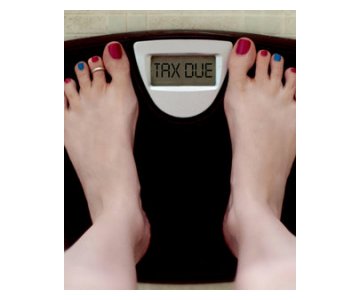
WSJ headline says Denmark scraps it's "much-maligned 'fat tax' after a year."
Danish lawmakers have killed a controversial "fat tax" one year after its implementation, after finding its negative effect on the economy and the strain it has put on small businesses far outweigh the health benefits.
Nations including Switzerland, the U.K, and Germany have held up the tax, which applies to any food containing more than 2.3% saturated fat, as a potential model for addressing obesity and other health concerns. But in Denmark, it has been a source of pain for consumers, food producers and retailers as the nation's economy struggles.
"The fat tax is one of the most maligned we [have] had in a long time," Mette Gjerskov, the minister for food, agriculture and fisheries, said during a news conference Saturday announcing the decision to dump the tax. "Now we have to try improving the public health by other means."
The failure of Denmark's fat tax is a demonstration of how difficult it can be to modify behavior by slapping additional duties on products seen by many as essential staples, especially during tough economic times. Products such as butter, oil, sausage, cheese and cream were subject to increases of as much as 9% immediately after the new tax was enacted.
"What made consumers upset was probably that an extra tax was put on a natural ingredient," said Sinne Smed, a professor at the Institute of Food and Resource Economics.
The fat tax comes to an end after netting an estimated €170 million ($216 million) in 2012 in new revenue. Danish lawmakers will slightly raise income taxes and reduce personal tax deductions to offset the lost revenue. The lawmakers also decided on Saturday to reverse an earlier decision to create a sugar tax.
"This is not what is needed in the current economic situation," said Holger Nielsen, Denmark's minister for taxation.
Human bodies are designed to crave fat, especially when we're stressed. The body is telling us to store up because things seem dangerous. This is evolution talking: if things are going south, better to stockpile fat now for the bad days ahead.
Problem is, modern life creates all sorts of stresses and modern food companies love moving this sort of product, because it nets them the highest profits.
End result: an obesity epidemic. The food companies know how to trigger our interest, and life provides all manner of stimuli that triggers our desire. The cost is pushed downstream.
Governments want cheap food but then regret the healthcare bill that follows. Governments then try to go punitive - actually on the consumer - by issuing a fat tax that the sellers pass on directly. Consumers get mad, tax gets scrapped.
Conservatives yell, "nanny state." But in truth, Western governments already lavish the ag and food industries with subsidies that encourage all this, meaning the nanny state is already here, she's just encouraging us to eat the worst sorts of food (or the most profitable to sellers). In relative terms, veggies and fruits aren't subsidized, grains are. So we're being fatted up by our nanny state for the healthcare providers.
Governments can't disincentivize bad eating by taxing people. They need to rejigger the already bad incentive system for ag and food companies.
Still, the fact that states are trying is an indicator of the progressive agenda that eventually must come.
But Big Food wins another round ("See, the evil government is trying to deny you your bad diet!" Cha-ching!)